
THE GAITHERS
 and
and
SOUTHERN GOSPEL

ADVISORY BOARD
David Evans, General Editor
Barry Jean Ancelet
Edward A. Berlin
Joyce J. Bolden
Rob Bowman
Susan C. Cook
Curtis Ellison
William Ferris
John Edward Hasse
Kip Lornell
Bill Malone
Eddie S. Meadows
Manuel H. Pea
Wayne D. Shirley
Robert Walser
THE GAITHERS
 and
and
SOUTHERN
GOSPEL
HOMECOMING IN THE
TWENTY-FIRST CENTURY

RYAN P. HARPER
University Press of Mississippi / Jackson
www.upress.state.ms.us
The University Press of Mississippi is a member of the Association of American University Presses.
Copyright 2017 by University Press of Mississippi
All rights reserved
Manufactured in the United States of America
First printing 2017
Library of Congress Cataloging-in-Publication Data
Names: Harper, Ryan P.
Title: The Gaithers and southern gospel : homecoming in the twenty-first century / Ryan P. Harper.
Description: Jackson : University Press of Mississippi, [2017] | Series: American made music series | Includes bibliographical references and index.
Identifiers: LCCN 2016040509 (print) | LCCN 2016040698 (ebook) | ISBN 9781496810908 (hardcover : alk. paper) | ISBN 9781496810915 (epub single) | ISBN 9781496810922 (epub institutional) | ISBN 9781496810939 (pdf single) | ISBN 9781496810946 (pdf institutional)
Subjects: LCSH: Gospel musiciansUnited StatesBiography. | Gaither, Gloria. | Gaither, Bill. | Gaither Vocal Band. | Gospel musicHistory and criticism.
Classification: LCC ML400 .H368 2017 (print) | LCC ML400 (ebook) | DDC 782.25/40922 [B] dc23
LC record available at https://lccn.loc.gov/2016040509
British Library Cataloging-in-Publication Data available
It was the excitement; all the people. And the music waswell, it was strenuous. She paused, trying to think what the music and dancing meant. It was such an odd day, she said. There was the outwardness, the people coming and the mass and the feasting and then the dance, and last of all the storm. Am I being silly, Joseph, or was there a meaning, right under the surface? It seemed like those pictures of simple landscapes they sell in the cities. When you look closely, you see all kinds of figures hidden in the lines. Do you know the kind of pictures I mean? A rock becomes a sleeping wolf, a little cloud is a skull, and the line of trees marching soldiers when you look closely. Did the day seem like that to you, Joseph, full of hidden meanings, not quite understandable?
John Steinbeck, To a God Unknown
CONTENTS

ACKNOWLEDGMENTS

Although the Gaithers spotlight their share of solo stars, the Homecomings are essentially ensemble affairs. The same has been true for my project. Inside the academy, this project took off at Duke Divinity School. Kate Bowler, Julie Byrne, Curtis Freeman, Mandy McMichael, Lauren Winner, and above all Grant Wacker, were my early encouragers and conversation partners. My spouse, Lynn, attended Wake Forest Divinity School at the same time, and I thank Brian Graves, Beth Honeycutt, Katharine Martin, and many other Wake Forest friends for transcending fierce ACC basketball rivalries to workshop my early ideas. Several incarnations of Princeton Universitys Department of Religion deeply informed and supported me. Marie Griffith brought me to Princeton and provided an important early ethnographic model. Judith Weisenfelds tireless support and advice is becoming the stuff of legend among scholars of American religion, and I was an immediate beneficiary of her care and attention. April Armstrong, Laura Bennett, Wallace Best, Mary Kay Bodnar, Pat Bogdiewicz, Vaughn Booker, Jessica Delgado, Josh Dubler, Lorraine Fuhrmann, Eddie Glaude, Rachel Gross, Matt Hedstrom, David Jorgensen, Rachel Lindsey, Kathryn Gin Lum, Emily Mace, Caleb Maskell, Anthony Petro, Michael Robertson, Kerry Smith, Jeff Stout, and Cornel West were ever-present models, advisors, and friends. Outside of the Department of Religion, Deborah Blanks, Alison Boden, Matt Ellis, Alex Karels, Michael Lamb, Paul Raushenbush, and Hana Shepherd were trusted colleagues and companions. My dear friends at Small World Coffee deserve a special thank-you, since so many of these pages first saw the light there. I also thank a Princeton population that was largely invisible to me: the once-and-current builders and maintainers of the Delaware and Raritan Canal trail system and Princeton Community Park. The thousands of miles I logged running, hiking, and biking in these locations provided me delightful, if often strenuous, respite from writing and reading, and made my work better and more enjoyable.
Outside of Princeton, Jim Goff, Doug Harrison, and Samira Mehta devoted their thoughts, support, and infectious energy for the project. Craig Gill, David Evans, the staff, and the outside readers at the University Press of Mississippi believed in this project in its early stages, and I thank them for their advice, patience, and care. Special thanks to Debbie Upton for the fine copy-editing work as well.
The people who appear in the following pages brought a special energy to my research. I am humbled and grateful that so many fans invited me into their livessometimes literally into their living rooms, often sight unseento share their thoughts and feelings on the Homecomings. Many Homecoming musicians shared what backstage moments they had with me, and they never failed to be welcoming to a conspicuous wanderer in their world. In the Gaither offices and backstage, Teri Garner, Jeralee Mathews, Emily Sutherland, Deana Warren, and Connie Williams helped orchestrate trips to Indiana and beyondalways with a kind and prompt word. Of course, the Gaither familyespecially Bill and Gloriadeserve a great deal of thanks for sharing their resources, thoughts, and time with me. This project would have been much more difficult were it not for Bills and Glorias willingness to talk with me, to read my work, to bring me into their work. Although as gospel music celebrities the Gaithers are used to people writing things about them that they probably would not write about themselves, as this project progressed I increasingly wondered how I would behave if I were in their shoeswith someone working on such a publication about me. I hope I could exhibit even a modicum of the grace and generosity they showed me.
Long before I stepped foot in the academy, this project had its origins in southeast Missouri, when as an elementary-school drummer I traveled on weekends with my familys southern gospel band, playing at church revivals and homecomings in the hinterlands of Missouri, Illinois, Kentucky, and Tennessee. Years before the first Gaither Homecomings, southern gospel was the soundtrack of my early life. Although my performing and listening tastes changed, I never forgot the genres pull and power in particular quadrants of Christian America. I thank my parents and siblings for raising me inside this music, and I am happy to revisit the music in itsand mylater light.
Next page
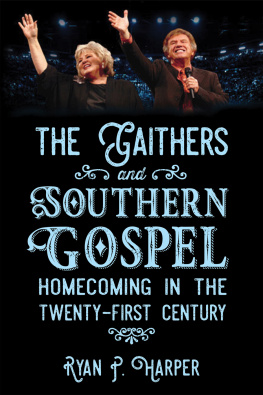
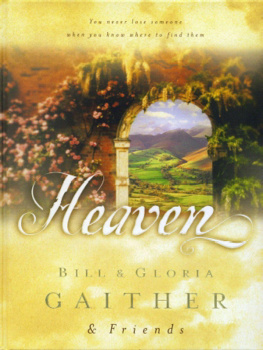

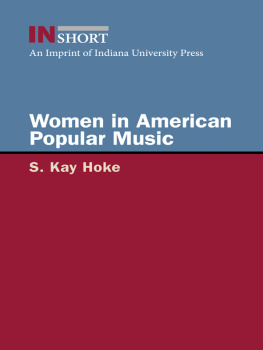
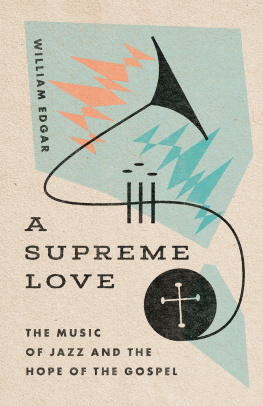
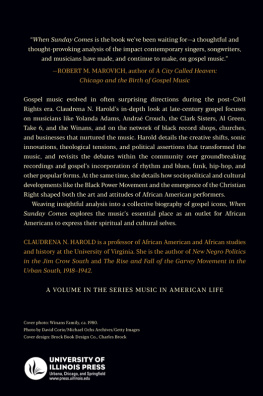
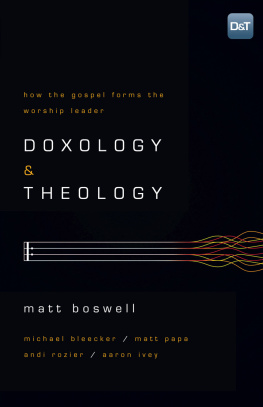

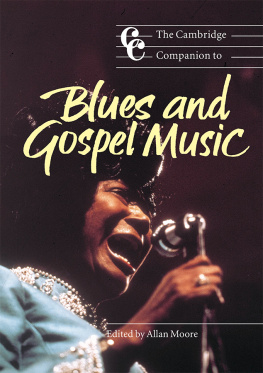
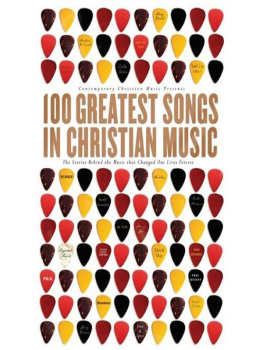

 and
and

 and
and

